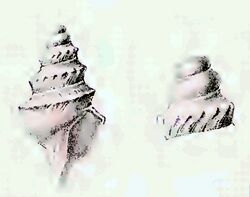Biology:Micropleurotoma melvilli
| Micropleurotoma melvilli | |
|---|---|

| |
| Original image of the shell and protoconch of Micropleurotoma melvilli | |
| Scientific classification | |
| Domain: | Eukaryota |
| Kingdom: | Animalia |
| Phylum: | Mollusca |
| Class: | Gastropoda |
| Subclass: | Caenogastropoda |
| Order: | Neogastropoda |
| Superfamily: | Conoidea |
| Family: | Horaiclavidae |
| Genus: | Micropleurotoma |
| Species: | M. melvilli
|
| Binomial name | |
| Micropleurotoma melvilli Sykes, 1906)
| |
| Synonyms[1] | |
| |
Micropleurotoma melvilli is a species of sea snail, a marine gastropod mollusk in the family Horaiclavidae.[1]
Description
The length of the shell attains 6 mm, its diameter 2.6 mm.
(Original description) The spire of the small, elongate, shell is well raised, varying a good deal in the relative proportions of length and breadth. The colour is hyaline white. It contains 6 whorls, turreted, carinated, regularly but slowly increasing. The suture is well marked, with a small strap-like rim below it. The protoconch is large, white, smooth and elevated. The remaining whorls are marked by a strong spiral keel, which is either smooth or bears acute nodules lines of growth well marked. The aperture is fairly broad. The columella is twisted at the base.[2]
Distribution
This species occurs in the demersal zone of the Atlantic Ocean off Portugal at depths between 1340 m and 2000 m.
References
- ↑ 1.0 1.1 Micropleurotoma melvilli (Sykes, 1906). Retrieved through: World Register of Marine Species on 31 March 2010.
- ↑ Sykes E. R. (1906). "On the Mollusca procured during the "Porcupine" Expeditions 1869–1870. Supplemental notes, part 3". Proceedings of the Malacological Society of London 7: 173–190.(described as Spirotropis melvilli)
- Gofas, S.; Le Renard, J.; Bouchet, P. (2001). Mollusca. in: Costello, M.J. et al. (eds), European Register of Marine Species: a check-list of the marine species in Europe and a bibliography of guides to their identification. Patrimoines Naturels. 50: 180–213
External links
- Rex, Michael A., et al. "A source-sink hypothesis for abyssal biodiversity." The American Naturalist 165.2 (2004): 163–178.
- Olabarria, Celia. "Faunal change and bathymetric diversity gradient in deep-sea prosobranchs from Northeastern Atlantic." Marine, Freshwater, and Wetlands Biodiversity Conservation. Springer Netherlands, 2006. 317–334.
- Bouchet, Philippe, and Marco Taviani. "The Mediterranean deep-sea fauna: pseudopopulations of Atlantic species?." Deep Sea Research Part A. Oceanographic Research Papers 39.2 (1992): 169–184.
Wikidata ☰ Q3723843 entry
 |

